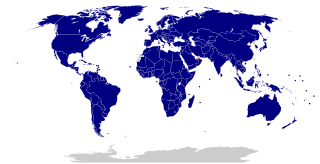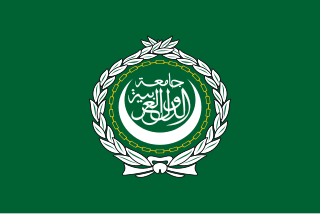Related Research Articles

The foreign relations of Jordan have been consistently a pro-Western foreign policy. Jordan had close relations with the United States and the United Kingdom. These relations were damaged when Jordan proclaimed its neutrality during the Gulf War and maintained relations with Iraq. In public, Jordan continued to call for the lifting of UN sanctions against Iraq within the context of implementing UNIC resolutions.

This is a list of diplomatic missions of Somalia, excluding honorary consulates. Foreign relations of Somalia are handled primarily by the President as the head of state, the Prime Minister as the head of government, and the Minister of Foreign Affairs of the Federal Government.

Ensuring national security, increasing influence among its Arab neighbours and securing the return of the Golan Heights, have been the primary goals of the Syrian Arab Republic's foreign policy. At many points in its history, Syria has seen tension with its neighbours, such as Turkey, Israel, Jordan, Iraq, and Lebanon. Syria enjoyed an improvement in relations with several of the states in its region in the 21st century, prior to the Arab Spring and the Syrian Civil War.

The diplomatic foreign relations of the United Arab Emirates are conducted by the Ministry of Foreign Affairs and International Cooperation.

The Arab League, formally the League of Arab States, is a regional organization in the Arab world, which is located in North Africa, West Asia, and part of East Africa. The Arab League was formed in Cairo on 22 March 1945, initially with six members: Egypt, Iraq, Transjordan, Lebanon, Saudi Arabia, and Syria. Yemen joined as a member on 5 May 1945. Currently, the League has 22 members.

Since its independence from France in 1962, Algeria has pursued an activist foreign policy. In the 1960s and 1970s, Algeria was noted for its support of Third World policies and independence movements. Since its independence, Algeria has been a member of the Arab League, the African Union and of the United Nations.

Port Sudan is a city and port on the Red Sea in eastern Sudan, and the capital of the state of Red Sea. Port Sudan is Sudan's main seaport and the source of 90% of the country's international trade.

The Cyberathlete Professional League (CPL) was a professional sports tournament organization specializing in computer and console video game competitions. It was founded by Angel Munoz on June 27, 1997, in Dallas, Texas. The CPL is considered the pioneer in professional video game tournaments, which have been held worldwide. The CPL's tournaments are open to all registrants, but due to the ESRB content rating of some video games, CPL competitions are restricted to participants age 17 or older. The CPL has distributed more than US$3 million in cash prizes.

The Council of Arab Economic Unity (CAEU) was founded by Egypt, Iraq, Jordan, Kuwait, Libya, Mauritania, Palestine, Saudi Arabia, Sudan, Tunisia, Syria, United Arab Emirates and Yemen on May 30, 1964, following an agreement in 1957 by the Economic Council of the Arab League.

The Arab Club Champions Cup is an annual club football competition organised by the Union of Arab Football Associations (UAFA) and contested by top-division clubs from the Arab world. The tournament is contested by a total of 37 teams from the Asian Football Confederation and the Confederation of African Football.

The Qatar Football Association is the governing body of football in Qatar. The QFA was founded in 1960 and is based in Doha, Qatar. It became a member of FIFA in 1963 and of AFC in 1967. The Qatar Football Association organizes the main leagues of the Qatar football league system: Qatar Stars League, Qatari Second Division, including domestic cups: Qatar Cup, Emir of Qatar Cup, Sheikh Jassim Cup, Qatari Stars Cup and Qatar FA Cup. The association is also responsible for the men's, U-17, U-20, U-23, women's national teams and the local women's, youth and futsal football leagues.
It is estimated that in the Middle East, over 900,000 people profess Buddhism as their religion. Buddhist adherents make up just over 0.3% of the Middle East total population. Many of these Buddhists are workers who have migrated from Asia to the Middle East since the late 1990s, many of them come from countries that have large Buddhist populations, such as China, Vietnam, Thailand, Sri Lanka, and Nepal.

The Arab League or League of Arab States was founded by Egypt in 1945, has 22 members and seven observer members so far: Armenia, Brazil, Chad, Eritrea, Greece, Republic of India, Venezuela.

The Culture of the United Arab Emirates is part of the culture of Eastern Arabia. Its historical population was a small tribal community that changed with the arrival of an influx of foreign nationals in the mid-20th century. Emirati culture is a blend of Arabian, Islamic, and Persian cultures, with influences from the cultures of East Africa and Indian Subcontinent. Islam has had a prominent influence on local architecture, music, attire, cuisine, and lifestyle.
The third round of AFC matches for the 2022 FIFA World Cup qualification was played from 2 September 2021 to 29 March 2022.
References
- ↑ "الهيكل التنظيمي". Lasportal.org. Retrieved 2022-07-20.
- ↑ "Basic Facts". Eg.china-embassy.org. Retrieved 2022-07-20.
- ↑ Mohammed Fouad Serry
- ↑ Ghanim Al Shibli